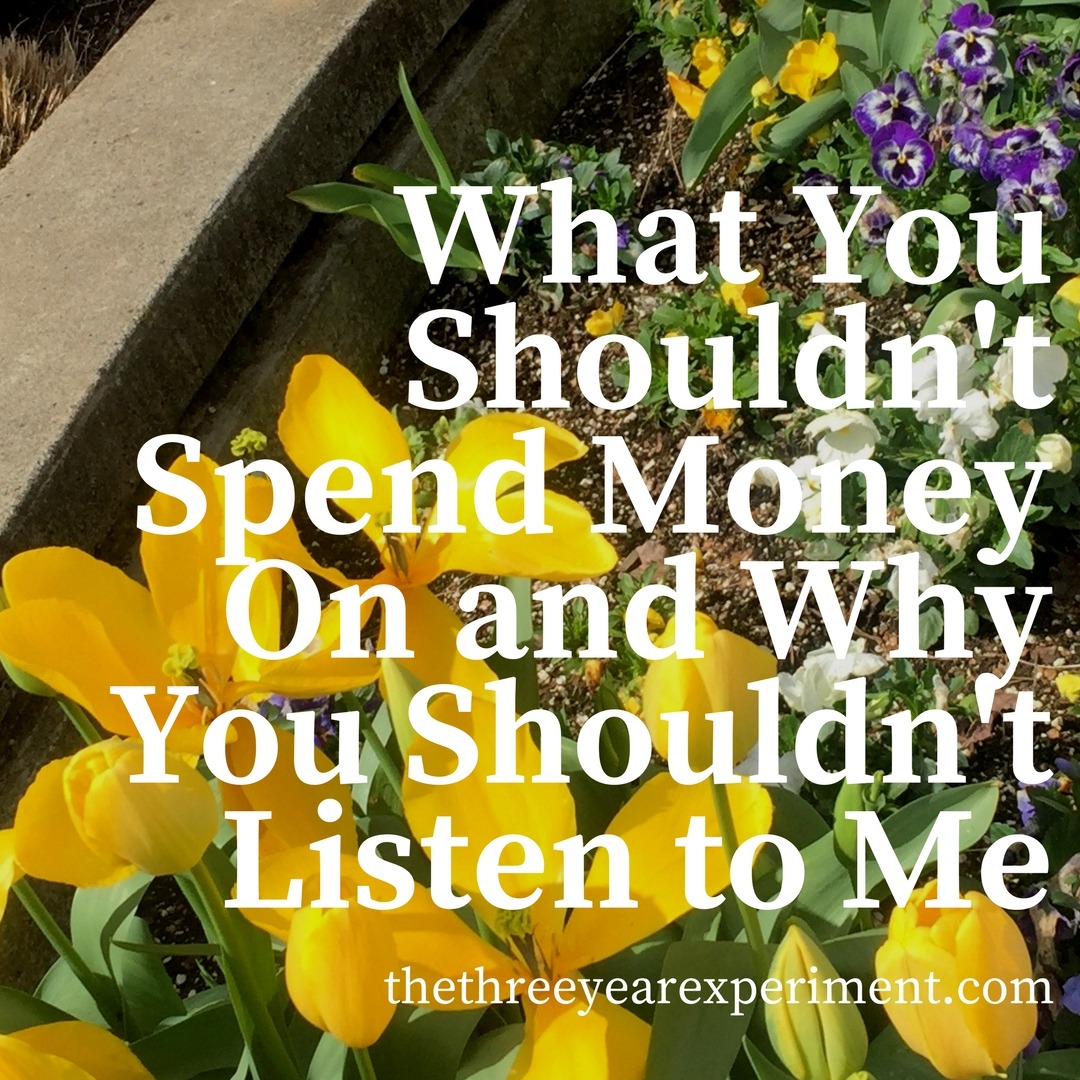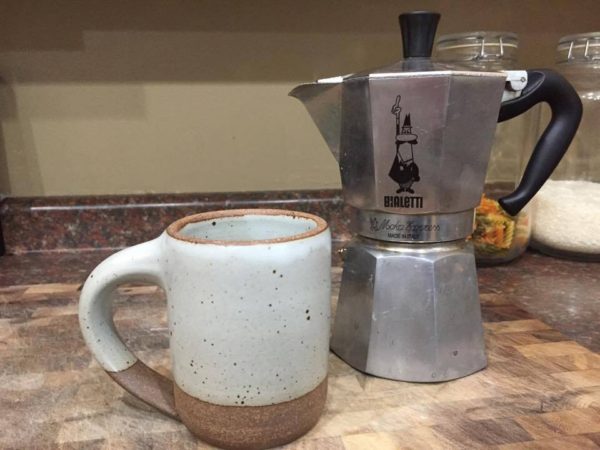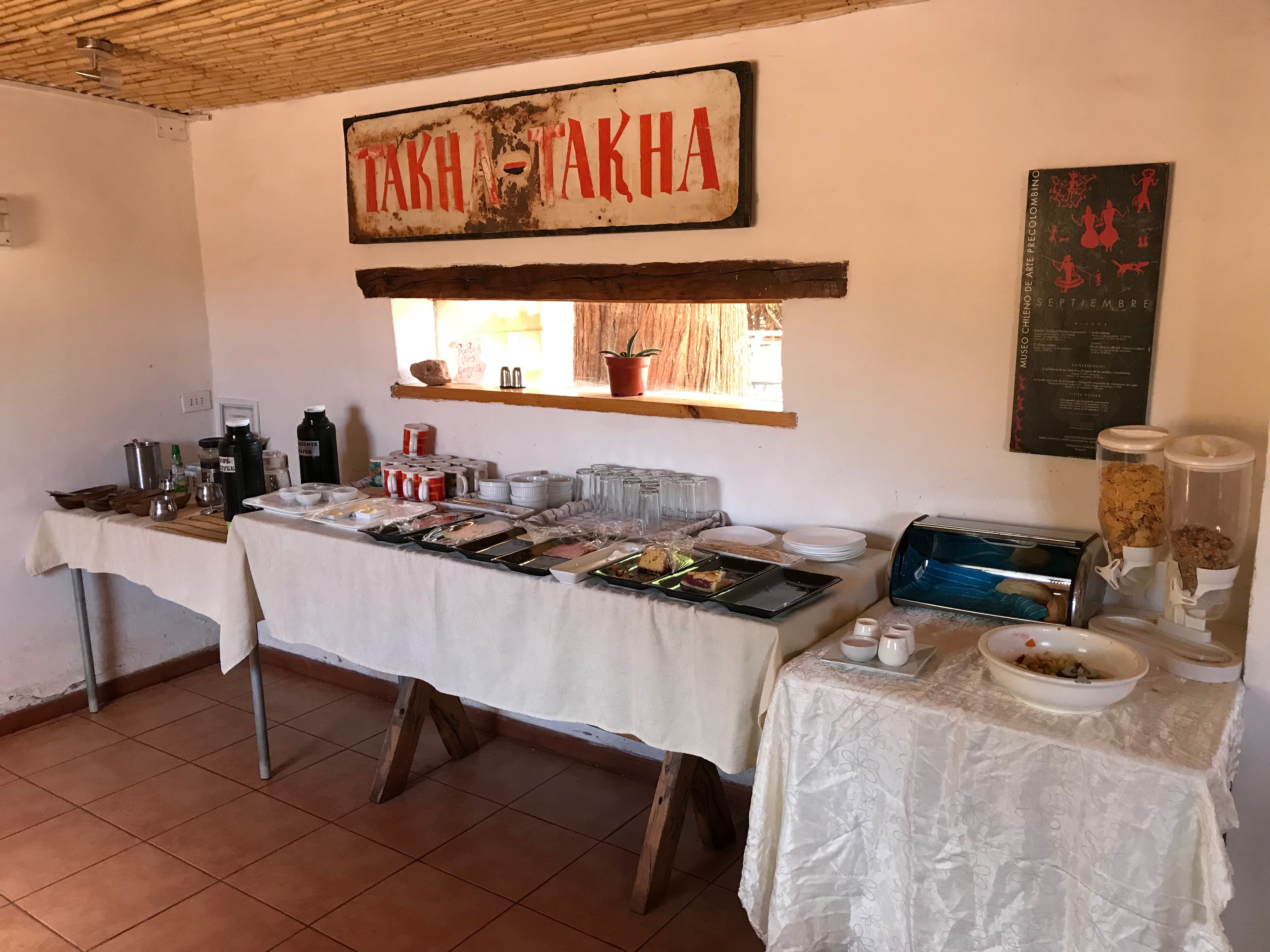Mr. ThreeYear and I have, over the course of our ten years of paying attention to finances, amassed a pretty decent net worth. We have done it by prioritizing spending in the areas that we care about (like saving for the future) and cutting spending in other areas. Many times on the blog, I write about the things that we do spend money on, like travel, and I can’t help but get excited and implore you to adopt similar spending habits. However, the truth is, this is a mistake on my part, and I apologize for it. You should not necessarily spend your money on the things I spend my money on. Nor should you save your money for the reasons that I save mine.
Why? Because you and I have different values. I’m sure some of our values coincide or else you probably wouldn’t be reading this blog for very long, but it is almost definitely true that you and I value some different things. Your values are based on where you grew up, how you grew up, the challenges you faced, things that went well for you, and special circumstances you currently have in your life. You prioritize your spending based on those values.

In our family, we value three things particularly highly: family, travel, and financial independence. We’ve saved a large portion of our incomes for retirement. We also spend a relatively large amount of money each year on travel because it’s important to us. We’re willing to spend more on travel and less on things that we don’t value as highly, like transportation. Finally, family is important to us. We are making life decisions in order to put our family first, and that means that other things will then become lower priorities. It’s why we spend money on activities we can do together, like skiing.
Since the amount of money that comes into everyone’s bank accounts each year is finite, we have to prioritize our spending. We buy things that are important to us, and in order to buy those things, we don’t buy other things (how well we do at making sure our spending is actually in line with our values can vary, but we’ll get to that). In my situation, we spend more money on having a secure financial future and less on having the latest material goods. Those are values that I hold dear, but they may not be your own. And of course, that’s absolutely fine.
Here are things I love to spend money on:
- a housekeeper
- original art for my house
- plants
- well-made canisters to hold leftovers
- gifts
- Christmas
- international vacay
- organic fair trade coffee
- index funds
Here are things I rarely spend money on:
- books (I use the library primarily)
- takeout coffee
- new clothes
- makeup
- brand-name sunglasses
- concerts
- sporting events
Our lists will look totally different and some of the items on my list may make you squirm. You’ve probably engaged in the exercise of judging others for the way they spend money.
“They’re buying a new house that costs how much? Why would they do that? What a waste!”
“Is he still driving that hunk of crap? It’s time for him to pony up and get a new car!”
“I can’t believe they spend that much on private school each year. Our public schools are just fine. Why would they do that?”
What we’re really doing in these instances is judging other people’s spending through our value system. And that just doesn’t work, because different things are important to different people.
Spending
We all spend. Even those of us who save 80% of our after-tax incomes spend (all that saving is actually spending, on financial independence. Investing your money is spending on the security of your future).
You may value a nice ride. Buying a new luxury sedan every three years may be a really important value for you. No matter how much I write about how much I love our small gas-sippers, you may laugh in the face of my Prius. More power to you–that’s your value. You could have grown up riding to school in a clunker, and promised yourself you’d never do that again as an adult. You could value the safety, the craftsmanship, or simple the aesthetics of a nice car.

I may spend way more on groceries or eating out than you would ever dream of (“What a waste! I mean, really”). You might never dream of prioritizing your beautiful home for yearly vacations overseas. The local beach is where you like to relax, anyway.
Your Values
If at all possible, come up with a list of the things that are valuable to you, so that you can make sure that you are spending on what’s truly important. After all, there’s nothing worse than realizing at the end of the year, that you spent $2000 on Starbucks takeout and only $500 on eating out, if eating out is something that you really enjoy, but you don’t particular care about takeout coffee, or you’re willing to make your own. In this case, it makes sense to make a change in spending because it will benefit your life for the better.
Once you figure out what matters to you, then you’re free to spend on the things that make you happy. In the personal finance community, a whole host of bloggers spend a lot of our money on future independence. While we post a lot of reasons and justifications for doing so, that high level of savings represents a value system.

Here’s the thing: most people, when they’re spending, aren’t consciously thinking about their values. This is something you need to train yourself to do. When we whip out our credit cards because we’re faced with something shiny and new that catches our eye, our short-term need for instant gratification overrides a longer-term plan. This is when the dreaded “I feel out of control about my spending” comes in to play. When you feel unable to make the long-term decisions you want because of the short-term bad choices, that’s when money anxiety happens.
When we paid off our debt and began to build up our net worth several years ago, we started tracking what we actually bought. Believe it or not, it was the reverse-engineered way to see what actually mattered to us. This is the single best way, in my opinion, to have a better conscious grasp over what you spend and why. Just write down everything you spend. If you write it down, you become more conscious of your spending decisions. Then, you begin to make better choices about what’s actually important to you.
My friend was loathe to start budgeting, because she thought she’d have to give up the things that mattered most to her–healthy, local food, quality-made clothing, and travel. But through the process, she realized that she didn’t have to give those things up at all. Instead, she could prioritize them over a fancy house. Her family just bought a fixer-upper in her dream state and they’re so happy with their spending choices.
Opportunity Doesn’t Just Knock; It Costs
I have been reading a very good book, Dollars and Sense: How We Misthink Money and How to Spend Smarter (that’s an affiliate link: check your library first, but if you buy it on Amazon, I appreciate you supporting the blog).
As is probably patently obvious, people don’t spend money rationally. In fact, we often spend money without realizing the consequences of those expenditures. For example, when you were stopping by the Starbucks for the third time this week on your way to work, you probably didn’t consciously think about the tradeoffs you were making: that you would not be able to go out to eat as much because of this decision, or you wouldn’t be able to buy a new pair of shoes.

In the same vein, if you’re at the car dealership, and you decide to lease or finance a pricey vehicle, you’re probably not thinking about the other purchases you’re giving up: an international vacation for the next three years, the ability to retire five years earlier, or dinners out twice a week. But you are in fact making those trade-offs because money is finite.
“Opportunity costs are what we should think about as we make financial decisions. We should consider the alternatives we are giving up by choosing to spend money now. But we don’t think about opportunity costs enough, or even at all. That’s our biggest money mistake and the reason we make many other mistakes. It is the shaky foundation upon which our financial houses are built” the authors write.
Therefore, don’t listen to me (or anybody else) when I talk about what to spend or not spend your money on, but remember: you should think about what you’re buying, and make sure it’s in line with your values. Otherwise, you’re like a speck of dust in the wind, being pushed around by every force that is immediately acting on you.
By tracking what you spend and figuring out your values, you can tell me, and anybody else, to go take a long trip off a short pier. Because you’ve got your money priorities straight.



I think we all have to put effort into spending money rationally. You’re right, we don’t always recognize sloppy spending habits for what they are – trade-offs. Being aware of the motivations behind what we want and how we spend has been key in changing to a much more intentional course.
Well-said, Kara: “we don’t recognize sloppy spending habits for what they are.” I feel like that describes some of my spending (that I’m not happy with) to a T! I definitely have benefitted from making realizations about why I spend and having a dialogue with myself about that (“OK, you’re feeling excited because it’s Spring, but do you really need to buy $80 of flowers at Home Depot? You can do other things to make the house look pretty”).
2 things i like right away in this article: the phrase “pony up.” and that simple espresso maker. oh, and as the spouse of a fantastic painter/artist, thank you for supporting the arts. we’re lucky to have a house full of original art. our wine budget would have many people shaking their heads but we’ll gladly sacrifice some travel expense or work a couple of extra years for it. it’s something we just love learning about and socializing over with like minded friends. i love sports but going to a stadium or arena for live sports is a rip-off. 25 dollar parking and 10 dollars beers don’t do it for me. oh, i love my crappy old linoleum floor and cheap laminate countertops because they paid in full.
Haha thanks Freddy! Our Bialetti makes great coffee. I bet your house is beautiful. My dad is a wine collector and even though I wouldn’t spend that much on wine (especially now that I don’t drink it), it gives him an absolute thrill. (As a side note, I was reading that for wine collectors, buying the wine and then storing it not only makes it taste better, but it makes it feel free to you. The longer the time between when you buy something and when you consume it, the less you are concerned about how much it cost). I agree with you about cheap laminate countertops. We have them as well. I loved them even more when I read an article about how they’re one of the best green choices you can make, too. Who knew? Cheap and environmentally sound. Added bonus! 🙂
This is all so, so true! YNAB has been transformative for me this past year. Now I track every single dollar in and dollar out…plus, can clearly chose my priorities and see opportunity costs. Thanks for the extra inspiration!
Dana, us too! (We’re still working on getting a month ahead, though). It’s a really valuable tool and it has made a big difference to our budgeting.
I agree, we all need to work out our own values and make moves to align our spending to them. And also be prepared to change, the things I value change all the time and I’m learning to roll with it. I ‘m all for travel, theatre and the outdoors, but do that bothered about my car, food or eating out.
Good point about changing values. I think as my kiddos get older the things I care about have changed a bit. When I was younger clothes and car were high on the list and now I think way more about saving for college and having enough time to be with my family. It’s probably worth a yearly reflection for all of us on what we’d like to put first this year.
This is something I’m focusing on this year: making sure I VALUE what I’m spending my money on. We saw Hamilton this past weekend, and I regret nothing about the expensive tickets. But I didn’t have leftovers to take to work for lunch on Tuesday, and I was unhappy that I spent $5 on a mediocre lunch at our work cafe.
Ha, yes! I do the exact same thing when I have to buy lunch at our school cafeteria. Wow, I hear Hamilton is amazing. Good choice!
Laurie that’s the most hipster cup I’ve ever seen. It’s cute! I like the downtrodden look! How much did it that cost?! xD
I don’t tell people to do with their spending unless its going to be a rash decision on a house, that’s too big of a purchase for me to not say anything. Otherwise, twizzlers or twerking lessons, god bless, have fun – it’s your money. I can only blog.
Haha thanks. My hipster sister gave it to me for Christmas. I think it was handmade in Charlotte somewhere. You know, for a house purchase, I think that’s warranted. It’s a big deal and I feel like some people buy a house without really taking the time to think it through. I agree with ya–thank goodness for the blog.
So appreciate this sentiment! It truly matters to really understand where your money is going and why.
🙂